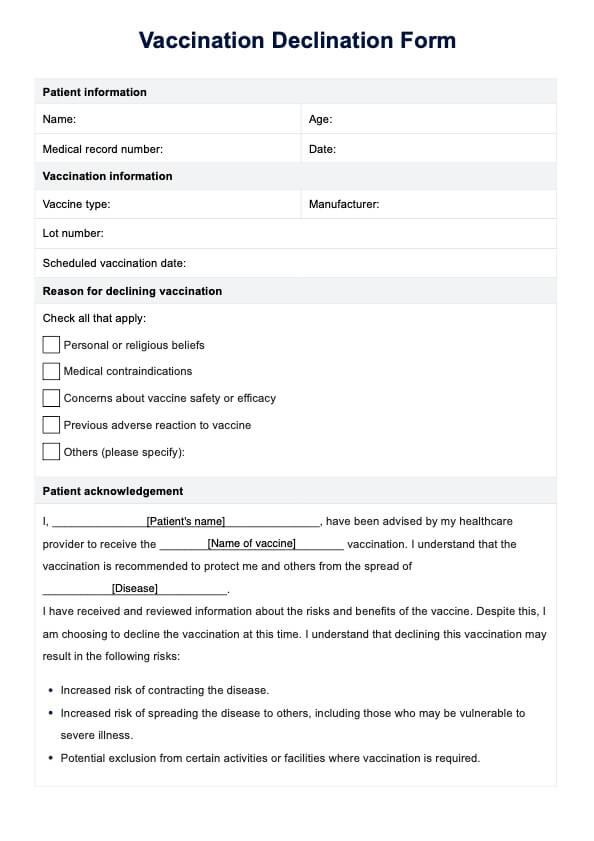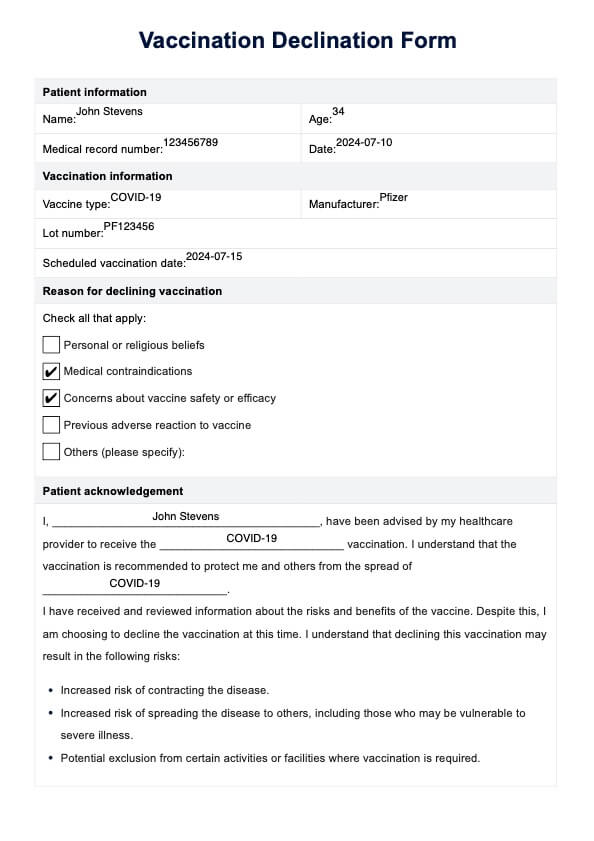Vaccination Declination Form
Ensure comprehensive documentation and legal protection with our Vaccination Declination Form template, essential for healthcare providers.


What is a Vaccination Declination Form?
A Vaccination Declination Form is a document used in healthcare settings when an employee or patient chooses to refuse a recommended vaccination. This form documents the patient’s informed decision, ensuring they understand the potential risks and consequences of declining the vaccine.
The main purpose of this form is to provide a legal record for healthcare providers and hospitals, demonstrating that the patient was fully informed about the benefits and risks associated with the vaccine and still chose to decline it. In some cases, signing the form is mandatory to ensure legal protection and documentation.
Why would a patient decline to take a vaccine?
Patients may decline vaccines for various reasons. Personal or religious beliefs can play a significant role, as some individuals refuse vaccinations due to ethical considerations, specific religious doctrines, or general mistrust of medical interventions. Understanding these beliefs helps healthcare providers address concerns respectfully and improve patient care.
Medical contraindications also influence vaccine refusal. Certain medical conditions or histories, such as severe allergies to vaccine components, past adverse reactions, or underlying health conditions, can make vaccinations risky for some patients. Identifying these contraindications is crucial for personalized patient management.
Concerns about vaccine safety or efficacy further contribute to vaccine hesitancy. Misinformation, past negative experiences, or general skepticism about medical interventions can lead to patient apprehension. Healthcare providers can alleviate these concerns by providing accurate information, addressing anxieties, and encouraging informed decision-making.
Vaccination Declination Form Template
Vaccination Declination Form Example
How to use our Vaccination Declination Form template
Our Vaccination Declination Form template is designed to help healthcare professionals document a patient’s decision to decline recommended vaccinations. Here’s how you can effectively use this template in five steps:
Step 1: Download and review the template
Start by downloading the Vaccination Declination Form template. Familiarize yourself with the sections to ensure you understand what information needs to be collected and documented.
Step 2: Discuss the vaccination with the patient
Discuss the recommended vaccination thoroughly with the patient, including the benefits, risks, and potential consequences of declining it. Ensure the patient has the opportunity to ask questions and fully understands the information provided.
Step 3: Complete the form with the patient
Fill out the form in the patient’s presence. Record the patient’s information, date, details of the vaccine, and the reason(s) for declining vaccination. Make sure to use the checklist to indicate specific reasons for declination.
Step 4: Obtain necessary signatures
Have the patient sign the form to acknowledge their understanding and decision to decline the vaccination. Ensure a witness, preferably a healthcare professional, also signs the form. Finally, the attending healthcare provider should sign to confirm that the discussion took place.
Step 5: File and document
Submit the completed form and file it in the patient’s medical record for future reference. Document the discussion and the patient’s decision in the medical notes to ensure comprehensive encounter documentation. Remember that the completed form should be submitted to the appropriate department for record-keeping.
Why is it important for healthcare providers to have this form?
A Vaccination Declination Form is essential for healthcare providers for several reasons, including legal protection, clear communication, and effective risk management.
Legal protection
A Vaccination Declination Form protects healthcare providers from potential legal liability. By documenting that the patient was fully informed about the benefits and risks of the vaccination and still chose to decline it, the form serves as evidence that the healthcare provider fulfilled their duty to educate the patient.
Clear communication
Using a Vaccination Declination Form facilitates clear communication between healthcare providers and patients. It ensures that patients fully understand the potential consequences of their decision and that their choice is based on informed consent. This clarity helps maintain trust and transparency in the patient-provider relationship.
Risk management
The Vaccination Declination Form is an essential tool for risk management. It helps healthcare providers identify and address why a patient declines vaccination. Understanding these reasons can lead to improved patient care strategies and potentially reduce the likelihood of patients declining necessary vaccinations. Additionally, the form helps healthcare providers manage the risks associated with occupational exposure to infectious diseases.
Commonly asked questions
A Vaccination Declination Form is a document used when a patient refuses recommended vaccinations. It records the patient’s informed decision and the potential risks of declining vaccination.
The Vaccination Declination Form should be signed by the patient, a witness (preferably a healthcare professional), and the attending healthcare provider. This ensures that all parties acknowledge the discussion and the patient’s decision.
A Vaccination Declination Form provides legal protection by documenting that the patient was fully informed of the benefits and risks of vaccination and chose to decline it. This helps mitigate potential legal claims against the healthcare provider.
Yes, patients can change their minds and request to receive the vaccination at any time. They should inform their healthcare provider of their decision so that the provider can void the form and then administer the vaccination.
The administration process involves informing employees about the vaccine’s benefits and offering it again. If an employee decides to receive the vaccination, the healthcare provider will administer it and update the records accordingly.
Being vaccinated is crucial as it protects against infectious diseases like hepatitis B and seasonal influenza. Employees who decline vaccination acknowledge the continued risk of acquiring these diseases due to occupational exposure.

























-template.jpg)













































































